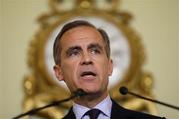- California Assembly OKs highest minimum wage in nation
- S. Korea unveils first graphic cigarette warnings
- US joins with South Korea, Japan in bid to deter North Korea
- LPGA golfer Chun In-gee finally back in action
- S. Korea won’t be top seed in final World Cup qualification round
- US men’s soccer misses 2nd straight Olympics
- US back on track in qualifying with 4-0 win over Guatemala
- High-intensity workout injuries spawn cottage industry
- CDC expands range of Zika mosquitoes into parts of Northeast
- Who knew? ‘The Walking Dead’ is helping families connect
UK STOCK INDEX ABOVE PRE-VOTE LEVEL: CRISIS OVER? NOT LIKELY
LONDON (AP) — Don’t be fooled: the rebound in Britain’s main stock market to where it was before the vote to leave the European Union does not mean all is now fine for the country’s economy.
The index is dominated by multinationals that do not reflect the national economy, which the Bank of England’s chief said Thursday would need more monetary stimulus after last week’s vote plunged Britain into an existential crisis and opened up new uncertainties for businesses.
“The bank has identified the clouds on the horizon,” Mark Carney said in a speech. “The economic outlook has deteriorated and some monetary policy easing will likely be required over the summer.”
That could mean a cut to interest rates or an injection of billions more into the financial system at the next meeting in two weeks.
He warned, however, that the central bank could not protect the country entirely from an economic shock. And he stressed it was important for the government to have a plan in how to navigate the country through uncertainty – a thinly veiled dig at the disarray engulfing Britain’s main political parties.
Britain’s economy is facing a drop in investment among businesses as it remains unclear what trade relationship Britain will have with the rest of the EU. Some have frozen hiring and issued warnings that their earnings will be lower than expected. Others are considering relocating some jobs to mainland Europe.
Carney’s highly anticipated speech came as the FTSE 100 index rebounded to levels above where it was before last week’s vote. Some politicians interpreted that as evidence that there is renewed optimism about the country’s future, even outside the EU.
The FTSE 100 was up 2.3 percent Thursday at 6,504, above the 6,338 level before the vote.
The index, however, is a poor indicator for the U.K. economy, experts say, as many of its listed companies are multinationals that do most of their business outside the country and benefit from the pound’s big slide since the vote, include an 11 percent drop against the dollar.
Oil companies BP and Royal Dutch Shell make their money in dollars, the currency in which crude is priced internationally. So when they bring that money back to Britain and translate it into pounds, their revenues will be higher.
Shares in BP and Shell are up 10 percent and 8 percent, respectively, since the vote – about as much as the pound has dropped, not coincidentally.
Other companies that have global operations will see their earnings made in other countries boosted when repatriated to the U.K. Fashion powerhouse Burberry, which has become popular in Asia, has also seen its shares rise since last week.
The global footprint that Britain’s biggest companies enjoy will help them through the uncertainty and will help the British economy to a certain degree.
But beyond this clutch of companies, there is no question that Britain’s companies are taking a hard hit. Companies that depend on access to the EU market, particularly financial companies, are down sharply. Barclays bank is down almost 30 percent.
The prospect of a looming recession could push house prices down. That has crushed shares in real estate companies like Taylor Wimpey, which is down 34 percent since the vote.
Another index of smaller, often more domestic companies, the FTSE 250, is down 8 percent. That includes companies involved in every aspect of the British economy – from property to retail, technology and services.
Retailer WH Smith, whose shops selling magazines, books and snacks are ubiquitous in British town centers, is down 9 percent. Auto Trader, which connects car buyers and sellers online, is down 17 percent as consumers are expected to have less disposable income in case of recession. Bakery chain Greggs is down 12 percent.












